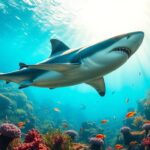When you think of sharks, the first image that might come to mind is a fierce predator gliding through the ocean. But have you ever wondered if these fascinating creatures possess intelligence? Sharks have long been misunderstood, often portrayed as mindless hunters. Yet, recent studies suggest there’s more to their behavior than meets the eye.
From problem-solving skills to social interactions, sharks display a range of cognitive abilities that challenge common perceptions. Understanding shark intelligence not only enriches our knowledge of these marine animals but also highlights their importance in the ecosystem. Dive in as we explore the intriguing question: Are sharks smart?
Understanding Shark Intelligence
Shark intelligence encompasses various cognitive abilities that reflect their adaptability and social behavior. By examining what defines intelligence in animals and how scientists assess it in sharks, you gain a deeper appreciation for these creatures.
What Defines Intelligence in Animals?
Intelligence in animals can include problem-solving skills, learning capabilities, and social interactions. Key indicators are as follows:
| Indicator | Description |
|---|---|
| Problem-Solving | Ability to navigate complex environments |
| Social Learning | Learning through observation of others |
| Memory | Retaining information over time |
| Adaptability | Adjusting behavior to new situations |
Sharks exhibit these traits, demonstrating that intelligence is not exclusive to mammals. Observed behaviors, such as using tools or collaborating in hunting, contribute to this understanding.
How Do Scientists Measure Shark Intelligence?
Scientists apply various methodologies to gauge shark intelligence accurately. Common techniques include:
| Method | Description |
|---|---|
| Behavioral Experiments | Testing responses to stimuli or problem-solving tasks |
| Observational Studies | Monitoring social behaviors in natural habitats |
| Cognitive Testing | Assessing memory and learning through tasks |
By analyzing these aspects, researchers gather insights into shark cognition, revealing their complex behaviors and advanced survival tactics. Each method offers a unique perspective on the cognitive capabilities of sharks, enhancing your understanding of their intelligence.
Evidence of Shark Intelligence
Research indicates that sharks display various forms of intelligence, primarily reflected in their problem-solving abilities and social interactions. These traits illustrate the complexity of their behavior and highlight their cognitive capabilities.
Problem-Solving Abilities
Sharks exhibit notable problem-solving skills during both natural behaviors and controlled studies. For instance, in a behavioral experiment, lemon sharks navigated mazes to locate food. Their success rate increased significantly after initial attempts, showcasing adaptive learning.
| Experiment Type | Outcome | Shark Species |
|---|---|---|
| Maze Navigation | Increased success with practice | Lemon shark |
| Food Retrieval | Improved techniques over time | Blacktip reef shark |
| Trap Avoidance | Learning to avoid fishing traps | Great white shark |
These findings indicate that sharks can not only learn from experience but also modify their strategies based on previously encountered obstacles.
Social Behaviors and Interactions
Sharks engage in social behaviors, often demonstrating complex interactions with one another. Research shows that they may form groups when hunting, highlighting their ability to collaborate and communicate effectively.
| Behavior Type | Description | Shark Species |
|---|---|---|
| Hunting Formation | Cooperative strategies in groups | Hammerhead shark |
| Social Play | Interactions with conspecifics | Nurse shark |
| Territorial Displays | Communication through body language | Bull shark |
Such behaviors suggest an understanding of their environment and social hierarchy, reinforcing the notion that sharks indeed possess a level of intelligence not often recognized.
Comparison with Other Marine Animals
Exploring shark intelligence in relation to other marine animals provides valuable insights into their cognitive abilities. This comparison highlights the different forms of intelligence exhibited by species like dolphins and octopuses.
Sharks vs. Dolphins
Dolphins are often viewed as the benchmark for marine intelligence. They display advanced problem-solving skills, social structures, and strong communication abilities. Comparatively, sharks exhibit intelligence through distinct survival strategies and environmental adaptability. Below is a table that outlines the key differences:
| Aspect | Sharks | Dolphins |
|---|---|---|
| Problem-Solving | Maze navigation, trap avoidance | Complex tasks, tool use |
| Social Structure | Loose aggregations | Strong pods with social hierarchies |
| Communication | Body language and signals | Vocalizations, echolocation |
| Learning Method | Experiential learning | Observational learning |
Sharks vs. Octopuses
Octopuses rank among the most intelligent invertebrates, showcasing remarkable problem-solving skills, such as opening jars and escaping enclosures. Sharks, in contrast, rely on instincts and learned behaviors honed over time. The following table illustrates these distinctions:
| Aspect | Sharks | Octopuses |
|---|---|---|
| Problem-Solving | Behavioral adaptations | Tool manipulation, puzzle solving |
| Learning Method | Trial and error | Insight and flexibility |
| Memory | Short and long-term memory | Exceptional short-term memory |
| Adaptability | Environmental awareness | Ability to camouflage and change behavior |
Both sharks and octopuses demonstrate unique forms of intelligence, underscoring the diversity of cognitive capabilities in marine life.
Myths and Misconceptions
Misunderstandings about sharks abound, often portraying them inaccurately. Clarifying these myths helps foster a more accurate view of shark behavior and their important role in the marine ecosystem.
Common Misconceptions About Shark Behavior
Sharks are often mistakenly considered mindless predators. However, research shows that they engage in complex behaviors. Some common misconceptions include:
| Misconception | Truth |
|---|---|
| Sharks attack humans relentlessly | Most attacks are cases of mistaken identity. |
| Sharks lack social interactions | Many sharks display social behaviors, including cooperative hunting. |
| Sharks can’t learn or adapt | Sharks learn from experiences, altering strategies for survival. |
These aspects illustrate that sharks possess cognitive abilities that go beyond their predatory reputation.
The Role of Sharks in Ecosystems
Sharks play a crucial role in maintaining healthy marine ecosystems. They act as apex predators, helping regulate prey populations. This regulation supports biodiversity and prevents overgrazing of vital habitats, such as coral reefs and seagrass beds.
| Role of Sharks | Impact |
|---|---|
| Prey Regulation | Maintains balance in the food web |
| Removal of Weak Individuals | Promotes healthier populations |
| Habitat Protection | Supports biodiversity and ecosystem health |
Understanding these roles highlights why preserving shark populations matters for ocean health.
Conclusion
Sharks are far more than just fierce predators; they exhibit a remarkable level of intelligence that deserves recognition. Their problem-solving skills and social interactions reveal a complexity often overlooked. By understanding their cognitive abilities, you can appreciate the vital role these creatures play in maintaining the health of our oceans.
As you explore the world of sharks, remember that they possess unique forms of intelligence that contribute to their survival and the ecosystems they inhabit. Embracing this knowledge not only enriches your perspective on marine life but also highlights the importance of protecting these incredible animals for future generations.
Frequently Asked Questions
What common misconceptions exist about sharks?
Many people view sharks solely as brutal predators. However, they are often inaccurately depicted, with myths suggesting they attack humans constantly or lack social interactions. In reality, sharks exhibit a range of behaviors, including learning, problem-solving, and socializing, which are essential for their survival.
How do scientists study shark intelligence?
Researchers assess shark intelligence through various methods like behavioral experiments, observational studies, and cognitive testing. These approaches help scientists understand their problem-solving skills, memory, social learning, and adaptability, revealing the cognitive complexities of these marine creatures.
Can sharks learn and adapt their behaviors?
Yes, recent studies show that sharks possess the ability to learn and adapt. For instance, lemon sharks navigate mazes for food, and great white sharks have modified their strategies to avoid fishing traps, indicating their capacity for experience-based learning.
How does shark intelligence compare to dolphins and octopuses?
While dolphins are often seen as the standard for marine intelligence, sharks demonstrate distinct cognitive abilities through survival strategies and environmental adaptability. Unlike octopuses, which exhibit notable problem-solving skills, sharks rely more on instincts and learned behaviors, showcasing diverse forms of intelligence.
What role do sharks play in marine ecosystems?
Sharks are apex predators, crucial for maintaining healthy marine ecosystems. They help regulate prey populations, supporting biodiversity and preventing overgrazing of important habitats like coral reefs. Their preservation is vital for the overall health of oceanic environments.

I am a passionate explorer of the deep sea, endlessly fascinated by the mysteries that lie beneath the ocean’s surface. From the graceful glide of a manta ray to the powerful presence of a great white shark, I find inspiration in every creature that calls the sea its home. My love for marine life began at an early age and has grown into a lifelong mission to study, understand, and share the wonders of our blue planet. Through Planet Shark Divers, I combine my enthusiasm for sharks and other sea animals with a dedication to education and conservation. Each article is crafted to unravel myths, reveal fascinating facts, and inspire respect for the extraordinary life forms that thrive in the depths. Whether it’s the biology of a hammerhead or the mystery of the deep abyss, my goal is to bring the ocean closer to everyone’s heart and mind.


